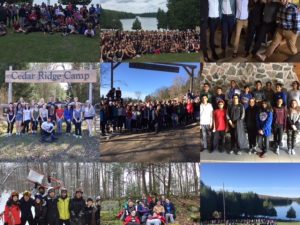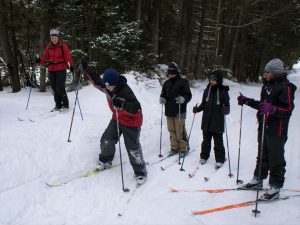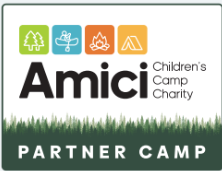Why is canoe tripping part of the Cedar Ridge philosophy?
At Cedar Ridge, we believe that all campers should participate in a canoe trip. Trips are designed to take into account the age and ability of the group. The youngest start with an overnight on the camp property. The oldest spend 5 days in Algonquin Park. LITs spend 6-10 days on trip. Sometimes, we’re asked why this is important. Why do we send people out of camp? How could there possibly be any benefit to canoeing all day, cooking on a fire, sleeping on the ground, and getting up in the morning to repeat the process? Here’s why:
I once had an LIT approach me before we set out on a six-day

Cedar Ridge Tripping
canoe trip. She was crying. She didn’t want to go. She was scared of the woods, of the idea of a portage, of sleeping in a tent, of not having a shower, of not knowing what to do, of not being strong enough,
of not being accepted by the others in the group because of this. With reassurances from me and encouragement from other LITs on the trip, she agreed to participate. There were challenges, there were triumphs, there were a few more tears, but she made it through the experience. When we arrived back at camp, tired and happy, she approached me again. She was crying. She felt accomplished. “You know how before we left, I was so scared and I didn’t want to go?” she asked. “I didn’t know I could do that. If you told me we were leaving tomorrow to do it again, I would be so happy!”
I think of that young woman often as I prepare for trips. Her fears were understandable and they were legitimate. The idea of a canoe trip can be daunting but the benefits are almost uncountable.
Physical: Campers are able to practise their canoeing skills, they can test their physical limits on portages, they can are active all day, outside in the fresh air.
Teamwork: Campers must learn to work together. It quickly becomes apparent to any group on a trip that there is no way to be successful unless everyone contributes. All participants have to paddle, portage, gather firewood, set up tents, help pack and unpack canoes, and help prepare meals. This reliance on each other allows campers to explore their own strengths and needs, and to think about the needs of the group.
Social: In a small group, and without a structured schedule or planned activities, campers are able to bond with one another. Spending all day in a canoe with another person is a perfect way to get to know them. The unstructured time also allows for spontaneous games, exploring, and meaningful conversation around the fire. Sharing the challenges, the triumphs, and the sometimes strange situations that are all part of canoe trips brings people together like no other experience.
(Dis)Connection: There are no phones on a canoe trip. There’s no Instagram. There’s no Snapchat. There are canoes, and lakes, and trees, and rocks, an incredible natural setting, and each other. While disconnecting from technology, campers are also able to explore and connect with the world around them. It is rare in our day-to-day lives that we have the chance to really sit and reflect on what is important to us but a canoe trip provides the perfect opportunity for a little bit of solitude.
Confidence
Possibly the best benefit of a canoe trip is the sense of accomplishment at the end of it. Whether they decide that canoe trips are their new favourite activity or that once was enough, a canoe trip experience can build confidence in a camper. Like the young woman in the story who said “I didn’t know I could do that”, many campers find that they are surprised by their own abilities on trip. The physical skills, the personal reflection, and the social bonding all come together to build the confidence to face challenges, take risks, push their own limits, and see what’s possible.






